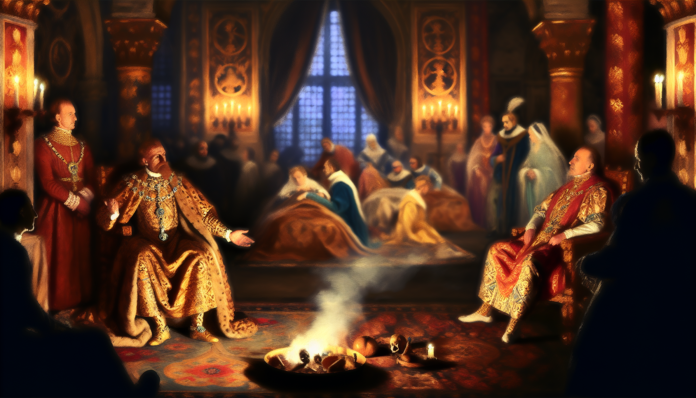Introduction
The 18th century was a period rife with political maneuvering and power struggles, but it also served as the backdrop for intimate scandals that would reverberate through history. One such scandal involves King Charles II of England, whose numerous affairs and personal entanglements stirred fascination and outrage in equal measure. Known as the “Merry Monarch,” his reign (1660-1685) came at a time when societal norms regarding morality and sexual conduct were in turmoil following the Puritan Commonwealth. As he indulged in a series of passionate liaisons, the King’s escapades would ultimately challenge and redefine the very nature of monarchy and public expectations.
The Scandal
King Charles II was no stranger to scandal. His reign was marked by clandestine affairs with women who were typically both beautiful and politically astute. Perhaps the most notorious of his paramours was Nell Gwyn, a former orange seller turned actress, who became one of the King’s most beloved mistresses. Their relationship defied the rigid moral codes of the time and added a layer of complexity to the King’s public image.
-
Details of the Affair: In 1670, Gwyn’s charm and wit won the King’s heart, leading to a passionate and lasting relationship. It has been speculated that Gwyn even bore the King two sons, though only one, Charles Beauclerk, was acknowledged and legitimized.
-
Key Events: When rumors about their affair began to circulate, the court buzzed with gossip. The public reacted with a mix of scandal and admiration, as Gwyn became a symbol of both the King’s freedom and neglect of traditional values.
- Historical Quotes: Playwright and contemporary John Dryden quipped, “In the world of the King, the Mistress sits on the throne.” This reflects the complex social dynamics that allowed Gwyn’s influence to flourish despite the inherent risks.
Moral and Cultural Analysis
The reaction to Charles II’s affairs was as multifaceted as the period itself. Society was rife with contradictions; while the King’s liaisons were often condoned in the walls of the palace, they were subject to scorn and scrutiny in public life.
-
Societal Reaction: The populace often turned a blind eye to the moral implications, choosing instead to revel in the royal excesses. However, dissenters viewed Gwyn as a “fallen woman,” a term often used to vilify women who participated in affairs outside marriage.
- Consequences: While Gwyn enjoyed royal favor, the implications for the King were profound. His public image became intertwined with notions of hedonism and luxury, which some critics argued eroded the sanctity of the crown.
Modern Perspectives
If a scandal of this nature were to occur today, the narrative would shift dramatically. Contemporary society places a greater emphasis on accountability, and public figures are often held to higher ethical standards.
-
Public Scrutiny: In the age of social media, the instantaneous and viral nature of information would likely lead to intense scrutiny and possibly even calls for resignation. The scandal surrounding Charles II would likely ignite debates about consent, power imbalances, and ethical conduct in relationships.
- Cultural Shift: Today, traditional views on monogamy and marriage have evolved, contributing to a more nuanced understanding of personal relationships. Interestingly, while Gwyn was both beloved and scorned in her time, contemporary voices might celebrate her as a trailblazer who navigated a male-dominated world with wit and charm.
Thus, the intimate affairs of King Charles II not only illuminate the moral complexities of the past but also invite reflection on how far societal attitudes toward sexuality and power have shifted over the centuries.

